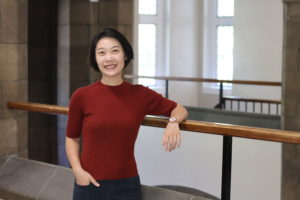
Prof. Yishu Wang
By Randall Brown.
Yishu Wang joined MSE as an assistant professor in August 2022 in a joint appointment with the Department of Physics. She brings to the college a focus on quantum magnetism and a commitment to connecting with fellow scientists conducting research in quantum materials.
“I hope to combine my previous expertise, my fresh perspectives about future research directions, and knowledge from my colleagues to bring in new developments to our quantum materials research program and to the field,” said Wang. “I am interested in developing an interdisciplinary research program that introduces device-based measurements to quantum materials and in return applies the discovery of quantum materials to designing devices.”
She looks forward to collaborations with colleagues from both MSE and physics who are experts in materials synthesis, theoretical modeling, and other related experimental measurements.
Stories in literature inspired Wang to pursue science and engineering in her youth. She loved reading biographies of history-making women scientists—particularly physicists.
“I remember reading biographic literature featuring Marie Curie, Rosalind Franklin, Chien-Shiung Wu, among others,” said Wang. “I was charmed by their personalities and inspired by their dedication to exploring nature. I thought that was the cool kind of person that I hoped to grow up into.”
She credits the continual influence of teachers, mentors, advisors, and colleagues for helping her maintain her passion for science, and she appreciates being able to take on those roles for others as she pursues her professional path.
“Of course, it is the science we do that ultimately ties us together,” said Wang. “I am excited to see the research field I jumped into emerge as one of the most active and diverse realms currently.”
She was drawn to quantum materials as an undergraduate while learning about superconductivity.
“The story of superconductivity demonstrated the beauty of theory, the elegance of experiments, and the power of science to advance technology,” she said.
Wang earned her PhD in 2018 at the California Institute of Technology after completing undergraduate studies in Beijing and a master’s degree at the University of Chicago. She shares a birthplace with Taoist philosopher Laozi—the small town of Luyi in central China.
“However, by the time I moved out of the town at age six, I had never read a single word from Taoist classics,” she said. “I spent the rest of my childhood and adolescence in Zhengzhou, the capital city of the same province, until I moved to Beijing for college.”
Wang is now getting to know the landscape and culture of East Tennessee.
“I am very much enjoying the natural environment—the mountains, the river, the sunset and clouds—and all the green trees,” she said. “I also like Knoxville as a city of an ideal size—vibrant but not too crowded to be stressful.”
At UT, Wang looks forward to developing interdisciplinary courses for quantum science and technology and connecting with the field.
“I am excited to join my colleagues of the quantum materials group to volunteer in educating young students of physics, materials science, electrical engineering, and other areas,” she said. “As we seek to harness the technological power of quantum mechanics to advance society, it becomes increasingly crucial to make such knowledge better embedded in the general education of science and engineering students.”